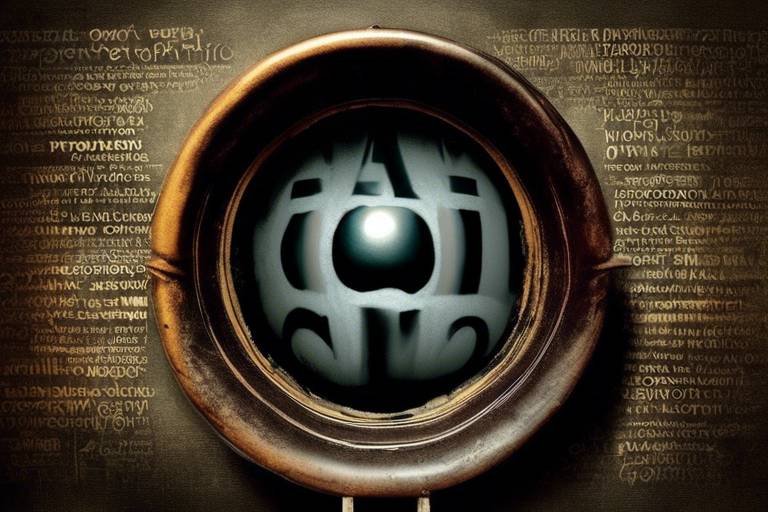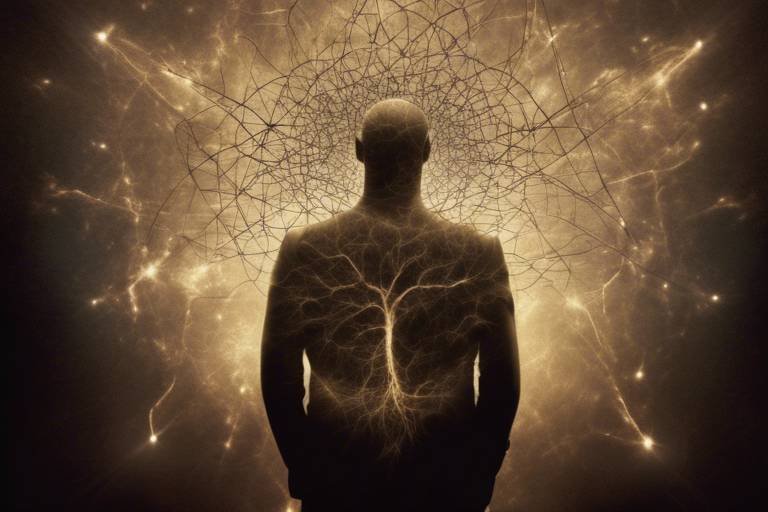Metaphysics - Exploring the Ethical Dimensions
Welcome to the fascinating world of metaphysics, where we delve into the fundamental questions about existence, reality, and the ethical implications that arise from these inquiries. It’s a realm that not only challenges our understanding of the universe but also compels us to reflect on our moral compass. Have you ever pondered the nature of reality or questioned the essence of right and wrong? These philosophical explorations are not just academic; they resonate deeply with our everyday lives and decisions.
Metaphysics serves as a foundation for many ethical theories, shaping how we perceive moral responsibility, free will, and the consequences of our actions. Imagine trying to navigate a vast ocean without a compass; that’s what it’s like to explore ethics without the guiding principles of metaphysical thought. The interplay between these disciplines is intricate and profound, revealing how our beliefs about existence can fundamentally alter our views on morality.
As we journey through this article, we will uncover the various philosophical perspectives that address the essence of existence. We’ll tackle the age-old debate between free will and determinism, and how these concepts influence our understanding of moral accountability. Furthermore, we’ll dive into meta-ethics, where we’ll question the very nature of moral judgments and whether they are universal truths or socially constructed ideas.
Join me as we embark on this intellectual adventure, exploring how metaphysical inquiries shape our ethical frameworks. By the end, you’ll not only grasp the complexities of these philosophical discussions but also appreciate their relevance in our daily lives. So, are you ready to challenge your perceptions and expand your understanding of morality and existence? Let’s dive in!
Understanding existence is fundamental in metaphysics. It poses the question: what does it truly mean to exist? Different philosophical perspectives offer varied insights into this profound inquiry. For instance, existentialists argue that existence precedes essence, suggesting that individuals create their own meaning in a seemingly indifferent universe. In contrast, essentialists believe that entities have intrinsic properties that define their existence.
This exploration of existence is not merely theoretical; it has significant implications for our ethical frameworks. If we view existence as a canvas upon which we paint our moral values, then understanding the nature of that canvas becomes crucial. Are our moral beliefs universal truths, or are they subjective constructs influenced by our experiences and societal norms? The answers to these questions shape our ethical judgments and the way we interact with the world around us.
The debate between free will and determinism raises crucial ethical questions that have perplexed philosophers for centuries. At its core, this discussion revolves around whether we are truly free to make choices or if our actions are predetermined by a chain of events beyond our control. This metaphysical inquiry directly impacts our understanding of moral responsibility and ethical decision-making.
Some philosophers argue that free will is merely an illusion, a comforting narrative we tell ourselves to cope with the complexities of life. If our choices are determined by prior states of the universe, then what does that mean for our sense of agency? This perspective challenges the very foundation of ethics, as it raises questions about accountability and the justification for punishment. If we are not truly in control of our actions, can we hold individuals morally responsible for their deeds?
If free will is indeed an illusion, it fundamentally alters our approach to moral responsibility. Traditional notions of ethics often hinge on the belief that individuals have the capacity to choose between right and wrong. However, if our actions are predetermined, we must reconsider how we assign blame and praise. This shift in perspective can lead to more compassionate approaches to justice, focusing on rehabilitation rather than punishment.
Compatibilism offers a reconciliatory approach between free will and determinism, suggesting that both can coexist. This view posits that even within a deterministic framework, individuals can still exercise a form of free will that is compatible with moral responsibility. Compatibilists argue that as long as individuals act according to their desires and intentions, they can be held ethically accountable. This perspective allows for a more nuanced understanding of human behavior and morality.
The implications of determinism extend beyond individual responsibility, influencing societal norms and moral judgments. If we accept a deterministic view of the universe, it may lead to a more collective understanding of ethics, where we prioritize systemic changes over individual blame. This shift can foster empathy and a sense of communal responsibility, encouraging us to address the root causes of unethical behavior.
Meta-ethics delves into the nature of moral judgments and statements, questioning their meaning and origin. This branch of philosophy examines how metaphysical beliefs shape our understanding of right and wrong. Are moral truths objective realities, or are they merely reflections of cultural norms and personal preferences? This inquiry is essential for developing a robust ethical framework.
The debate between moral realism and anti-realism centers on the existence of moral truths. Moral realists assert that there are objective moral facts that exist independently of human beliefs, while anti-realists argue that moral judgments are subjective and contingent on individual or societal perspectives. Understanding where you stand in this debate can significantly impact your ethical theories and practices.
Constructivism posits that moral truths are constructed rather than discovered. This viewpoint suggests that our ethical frameworks are shaped by social agreements and collective experiences. By examining how this view interacts with metaphysical ideas, we can gain insights into the fluid nature of morality and the ways in which it evolves over time. Constructivism encourages us to engage in ongoing dialogue about ethics, fostering a dynamic understanding of right and wrong.
- What is the main focus of metaphysics? Metaphysics explores the fundamental nature of reality, including questions about existence, objects, and their properties.
- How does metaphysics relate to ethics? Metaphysical inquiries shape our understanding of morality, influencing concepts like free will, moral responsibility, and the nature of moral truths.
- What is the difference between moral realism and anti-realism? Moral realism asserts the existence of objective moral truths, while anti-realism contends that moral judgments are subjective and culturally dependent.
- Can free will and determinism coexist? Compatibilism suggests that free will can exist within a deterministic framework, allowing for moral responsibility despite predetermined actions.

The Nature of Existence
Understanding existence is fundamental in metaphysics, acting as the bedrock upon which all philosophical inquiries are built. When we ponder the question, "What does it mean to exist?", we are not just engaging in abstract thought; we are exploring the very essence of reality itself. Various philosophical perspectives provide unique insights into existence, shaping our ethical frameworks and influencing how we perceive morality in our lives.
One of the most profound aspects of existence is the distinction between being and non-being. Philosophers like Heidegger and Sartre have delved into these concepts, arguing that our understanding of existence is deeply intertwined with our consciousness and experience. For instance, Heidegger posits that to exist is to be "thrown" into a world that we must navigate, while Sartre emphasizes that existence precedes essence, suggesting that we create our own meaning in a universe that offers none. This leads us to consider how these existential philosophies impact our ethical considerations.
Moreover, the debate between materialism and idealism further enriches our understanding of existence. Materialists argue that only physical entities exist, while idealists contend that reality is fundamentally mental or spiritual. This dichotomy has significant implications for ethics. If we accept a materialist view, our moral judgments may be seen as products of evolutionary processes, driven by survival and social cohesion. In contrast, an idealist perspective might suggest that our moral intuitions are reflections of a higher reality or universal truths.
To illustrate these contrasting views, consider the following table:
| Philosophical Perspective | Implications for Ethics |
|---|---|
| Materialism | Ethics as a product of social evolution and survival instincts. |
| Idealism | Ethics as reflections of universal truths or higher moral realities. |
In addition to these perspectives, the concept of existentialism plays a crucial role in shaping our ethical landscape. Existentialists argue that individuals must confront the absurdity of existence and take responsibility for their actions. This notion emphasizes the importance of personal choice and authenticity in ethical decision-making. As we navigate through life's complexities, the existentialist view encourages us to forge our own paths, reflecting on how our choices impact not only ourselves but also the broader universe.
Ultimately, the nature of existence is not just a philosophical puzzle; it is a lens through which we view our ethical responsibilities. By exploring different metaphysical perspectives, we can gain a deeper understanding of our moral obligations and the implications of our choices. As we grapple with these profound questions, we are reminded that our existence is not merely about being alive; it is about how we choose to live and the ethical frameworks we adopt along the way.
- What is metaphysics? Metaphysics is a branch of philosophy that explores the fundamental nature of reality, including concepts like existence, being, and the universe.
- How does metaphysics relate to ethics? Metaphysical beliefs shape our understanding of morality, influencing how we perceive right and wrong.
- What is the significance of existentialism in ethics? Existentialism emphasizes personal responsibility and authenticity, encouraging individuals to make ethical choices based on their own experiences and beliefs.

Free Will and Determinism
The age-old debate between free will and determinism is one that has captivated thinkers for centuries. At its core, this discussion revolves around the question: Are we the architects of our own destinies, or are our lives predetermined by a series of external factors? This inquiry is not merely academic; it has profound implications for how we perceive moral responsibility and ethical decision-making. If our choices are genuinely free, then we can be held accountable for our actions. Conversely, if determinism reigns supreme, we may need to reconsider our understanding of guilt, blame, and ethical behavior. The nuances of this debate invite us to explore the very fabric of existence and the principles that govern our moral compass.
To better grasp the complexities of this discussion, let's break down the fundamental concepts:
| Concept | Description |
|---|---|
| Free Will | The ability to make choices that are not determined by prior causes or divine intervention. |
| Determinism | The philosophical belief that all events, including human actions, are determined by preceding events in accordance with the natural laws. |
Philosophers have proposed various positions within this debate, each offering unique insights. For instance, some argue that humans possess genuine free will, allowing for autonomous decision-making. Others contend that our choices are significantly influenced by factors such as genetics, environment, and upbringing, suggesting that our perceived freedom is simply an illusion.
Additionally, this discourse raises critical questions about moral responsibility. If our actions are predetermined, can we truly be held accountable for our choices? This line of thinking challenges the traditional notions of ethics, where personal accountability is a cornerstone. Imagine a world where actions are dictated by a predetermined script—how would we navigate concepts of justice, punishment, and reward? The implications are staggering.
On the flip side, proponents of compatibilism argue for a middle ground, asserting that free will and determinism can coexist. They suggest that even within a deterministic framework, individuals can still be considered morally responsible for their actions as long as they act according to their desires and motivations. This perspective allows for a nuanced understanding of ethics, where choices may be influenced by external factors, yet individuals remain accountable for their decisions.
Ultimately, the interplay between free will and determinism invites us to reflect on our understanding of morality. It challenges us to consider how our beliefs about choice and accountability shape societal norms and ethical frameworks. As we continue to navigate this complex terrain, it becomes increasingly clear that our philosophical inquiries into free will and determinism are not just theoretical musings; they are integral to how we live our lives and relate to one another.
- What is free will? Free will is the ability to make choices that are not solely determined by external factors.
- What is determinism? Determinism is the belief that all events, including human actions, are determined by preceding events and natural laws.
- Can free will and determinism coexist? Yes, compatibilism suggests that free will can exist within a deterministic framework, allowing for moral responsibility.
- How does this debate affect ethics? The debate influences our understanding of accountability, justice, and the moral implications of our choices.

The Illusion of Free Will
Imagine standing at a crossroads, each path representing a different choice in life. The feeling of freedom as you decide which way to go is exhilarating, isn’t it? But what if I told you that this sense of choice might be nothing more than an illusion? The concept of free will has been a hot topic in philosophy, sparking debates that stretch across centuries. Some philosophers argue that our choices are merely the result of predetermined factors, such as genetics, environment, and past experiences, rather than genuine freedom. This perspective challenges our conventional understanding of moral accountability and raises profound questions about the essence of our existence.
At its core, the argument against free will suggests that our thoughts and actions are influenced by a complex web of causation. For instance, consider the decision to eat a particular food. While it feels like a personal choice, factors like cultural background, upbringing, and even biological urges play a significant role in shaping that decision. This leads us to ponder: if our choices are predetermined, can we truly be held responsible for our actions? The implications of this view are staggering, as they challenge the very foundation of ethics and morality.
Furthermore, if we accept that free will is an illusion, we must confront the uncomfortable reality of moral responsibility. How can we justifiably blame someone for their actions if those actions were never truly their own? This perspective invites a reevaluation of our legal and social systems, which are built on the premise that individuals are accountable for their choices. The idea that we are merely puppets in a grand cosmic play can be disheartening, yet it also opens the door to a more compassionate understanding of human behavior.
To illustrate this further, consider the following table that summarizes the key arguments surrounding the illusion of free will:
| Argument | Description |
|---|---|
| Determinism | The belief that all events, including human actions, are determined by preceding events and natural laws. |
| Neuroscience | Studies suggest that brain activity related to decision-making occurs before we consciously make a choice, indicating a lack of free will. |
| Environmental Influence | Our decisions are heavily influenced by external factors, such as society, culture, and personal experiences. |
Despite these compelling arguments, the notion of free will continues to hold a significant place in our hearts and minds. It’s almost as if we cling to the idea of autonomy as a lifeline in a world that often feels chaotic and predetermined. This internal conflict raises another question: can we reconcile the illusion of free will with our ethical frameworks? Some philosophers suggest that acknowledging the illusion doesn't negate moral responsibility but instead encourages a more empathetic approach to understanding human behavior.
In conclusion, while the debate over the illusion of free will may seem abstract, its implications are profoundly practical. It forces us to reconsider how we view ourselves and others, potentially leading to a more compassionate and understanding society. By recognizing that our choices may be influenced by factors beyond our control, we can foster a sense of empathy and responsibility that transcends traditional moral judgments.
- What is the main argument against free will? The main argument suggests that our choices are influenced by predetermined factors, challenging the notion of true autonomy.
- How does the illusion of free will affect moral responsibility? If free will is an illusion, it complicates the concept of moral accountability, as actions may not be entirely within an individual's control.
- Can we still hold people accountable for their actions if free will is an illusion? Yes, some argue that acknowledging the illusion of free will can lead to a more compassionate understanding of human behavior while still maintaining a sense of accountability.

Consequences for Moral Responsibility
When we entertain the idea that free will is an illusion, we are led to profound questions about moral responsibility. If our choices are merely the result of biological impulses or environmental factors, can we truly hold individuals accountable for their actions? This dilemma challenges the very foundation of our ethical systems, which often rely on the assumption that people have the autonomy to make choices. The implications are staggering and force us to reconsider how we judge behavior.
For instance, if a person commits a crime, traditional views would lead us to believe that they made a conscious decision to engage in that behavior. However, if we accept that their actions were predetermined by a series of past events, genetic predispositions, or social influences, we might begin to question the fairness of punishment. Are we punishing them for something they had no control over? This line of thought can create a ripple effect throughout our justice system, influencing everything from sentencing to rehabilitation.
Moreover, this view can lead to a broader societal shift in how we perceive morality. If we see individuals as products of their circumstances, we might develop a greater sense of empathy and understanding towards those who err. Instead of labeling someone as simply "bad" or "evil," we might consider the multitude of factors that led to their actions. This could foster a more compassionate approach, focusing on rehabilitation rather than retribution.
However, the challenge remains: how do we maintain a sense of justice in a world where free will is questioned? Some philosophers argue that we can still hold people accountable by focusing on the consequences of their actions rather than the intentions behind them. This perspective suggests that even if we lack free will, society still benefits from establishing norms that discourage harmful behavior. In this way, we can create a framework for accountability that acknowledges our limitations while promoting social order.
In summary, the consequences of viewing free will as an illusion stretch far beyond individual responsibility. They invite us to rethink our ethical frameworks, our legal systems, and our societal values. As we navigate this complex landscape, it becomes essential to foster discussions that challenge our assumptions and explore the intricate dance between determinism and moral accountability.
- What is moral responsibility?
Moral responsibility refers to the accountability individuals have for their actions, particularly in the context of ethical judgments and societal norms.
- How does determinism affect moral responsibility?
Determinism suggests that all events, including human actions, are determined by preceding events and natural laws, which can challenge traditional notions of moral accountability.
- Can we still hold people accountable if free will is an illusion?
Yes, some argue that accountability can be maintained by focusing on the consequences of actions rather than the intentions behind them, promoting social order and rehabilitation.
- What is the role of empathy in understanding moral responsibility?
Empathy allows us to consider the various factors influencing a person's actions, leading to a more compassionate approach to ethics and accountability.

Compatibilism: A Middle Ground
In the grand debate of free will versus determinism, compatibilism emerges as a fascinating middle ground, offering a unique perspective that seeks to harmonize these seemingly opposing views. At its core, compatibilism suggests that free will and determinism are not mutually exclusive; rather, they can coexist in a way that preserves our sense of moral responsibility. Imagine a river flowing through a valley: while the water's path is determined by the landscape, it still moves freely within those boundaries. This analogy encapsulates the compatibilist position, where human choices flow freely but are shaped by prior causes and conditions.
Compatibilists argue that even if our actions are determined by a chain of prior events, we can still be considered free in the sense that we act according to our desires and intentions. This perspective invites us to redefine what we mean by freedom. It suggests that true freedom does not require absolute independence from causation; instead, it can be understood as the ability to act in accordance with one's own motivations and values. So, when we make a choice, even if that choice is influenced by past experiences, we are still exercising a form of freedom that is meaningful in an ethical context.
One of the most compelling aspects of compatibilism is its implications for moral responsibility. If we accept that individuals can be held accountable for their actions, even in a deterministic framework, we can maintain a robust ethical system. For instance, a compatibilist might argue that a person who commits a crime, driven by their upbringing and circumstances, can still be held responsible for their actions because they acted on their own desires, albeit influenced by external factors. This view allows for a compassionate understanding of human behavior, recognizing that while we are shaped by our environment, we still possess the capacity to make choices.
To further illustrate this point, consider the following table that outlines the key differences between determinism, libertarian free will, and compatibilism:
| Concept | Definition | Moral Responsibility |
|---|---|---|
| Determinism | All events, including human actions, are determined by preceding events and natural laws. | Limited; actions are predetermined. |
| Libertarian Free Will | Humans have the ability to make choices free from causal determinism. | Full; individuals are entirely responsible for their choices. |
| Compatibilism | Free will and determinism are compatible; individuals can act freely within determined frameworks. | Conditional; individuals can be held accountable based on their desires and intentions. |
This nuanced understanding of moral responsibility allows us to engage with ethical dilemmas more thoughtfully. It acknowledges the complexity of human behavior while still holding individuals accountable for their choices. By embracing compatibilism, we can foster a more empathetic approach to ethics, one that considers the myriad factors influencing our decisions while still acknowledging the importance of personal agency.
In conclusion, compatibilism serves as a bridge in the philosophical landscape, connecting the dots between free will and determinism. It challenges us to rethink our assumptions about freedom and responsibility, urging us to recognize that our choices, while influenced by a web of causation, still reflect our personal values and desires. This perspective not only enriches our understanding of ethics but also encourages a more compassionate view of human behavior, reminding us that we are all navigating the complexities of existence together.
- What is compatibilism? Compatibilism is the philosophical view that free will and determinism are compatible, meaning that individuals can still have moral responsibility even if their actions are determined by prior causes.
- How does compatibilism differ from libertarian free will? Unlike libertarian free will, which posits that individuals can make completely independent choices, compatibilism suggests that choices can be influenced by prior events while still allowing for personal agency.
- Can compatibilism support moral responsibility? Yes, compatibilism maintains that individuals can be held accountable for their actions, as long as those actions align with their desires and intentions, even if influenced by external factors.

Ethical Implications of Determinism
When we dive into the waters of determinism, we find ourselves navigating a sea of ethical implications that can feel both daunting and enlightening. At its core, determinism posits that every event, including human actions, is determined by preceding events in accordance with the natural laws of the universe. This brings forth a myriad of questions about our moral judgments and the very foundation of ethics itself. If our choices are predetermined, do we truly possess moral agency? Are we responsible for our actions, or are we merely players in a cosmic play, following a script written long before we arrived on the scene?
To unpack these questions, it's essential to consider how a deterministic worldview reshapes our understanding of ethical responsibility. If every decision we make is the result of a chain of prior causes, the notion of personal accountability becomes murky. For instance, imagine a scenario where a person commits a crime. Under a deterministic lens, one might argue that this individual was bound by their circumstances, upbringing, and even biological predispositions. This raises the question: should we blame them for their actions, or should we view them as victims of their own history?
Moreover, the implications of determinism extend beyond individual actions to societal norms and legal systems. If we accept that people are not fully in control of their choices, how does that affect our approach to punishment and rehabilitation? Traditional views of justice often hinge on the idea of retribution—punishing wrongdoers as a means of moral balance. However, in a deterministic framework, this retributive approach may seem unjust. Instead, we might lean towards a more rehabilitative model, focusing on understanding the root causes of behavior and working to correct them, rather than simply punishing the outcome.
In light of these considerations, it's crucial to explore how various ethical theories respond to the challenges posed by determinism. For example:
- Utilitarianism - This theory, which advocates for the greatest good for the greatest number, might adapt by emphasizing outcomes rather than individual choices.
- Kantian Ethics - On the other hand, Kantian ethics, which emphasizes duty and intention, may struggle to maintain its stance on moral responsibility if free will is questioned.
Ultimately, the ethical implications of determinism compel us to rethink our assumptions about morality and responsibility. They challenge us to consider a more nuanced understanding of human behavior, one that acknowledges the complex interplay of factors influencing our decisions. As we reflect on these ideas, we might find ourselves asking: how can we foster a society that balances understanding with accountability? How do we create ethical frameworks that recognize our shared humanity while still holding individuals accountable for their actions?
- What is determinism? - Determinism is the philosophical view that all events, including human actions, are determined by previously existing causes.
- How does determinism affect moral responsibility? - If our choices are predetermined, it raises questions about whether individuals can be held morally accountable for their actions.
- Can we have ethics in a deterministic framework? - Yes, many ethical theories adapt to incorporate determinism by focusing on outcomes or societal influences rather than individual choices.

Meta-Ethics: The Nature of Moral Judgments
Meta-ethics dives deep into the philosophical waters of moral judgments and the underlying principles that govern them. It’s like peeling back the layers of an onion, revealing the core beliefs and assumptions that shape our understanding of right and wrong. At its essence, meta-ethics asks questions such as: What does it mean to say something is 'good'? Are there objective moral truths, or are moral judgments merely subjective opinions?
One of the central debates in meta-ethics is between moral realism and anti-realism. Moral realists argue that there are moral facts that exist independently of human beliefs or feelings. They assert that statements like "murder is wrong" reflect an objective reality, much like scientific truths. On the flip side, anti-realists contend that moral values are constructed by societies or individuals, suggesting that there is no universal moral truth that applies to everyone. This divergence in thought leads to a fundamental question: if moral truths exist, how do we access or understand them?
In exploring these ideas, we encounter the concept of constructivism, which posits that moral truths are not discovered but rather constructed through social agreements and individual reasoning. Imagine building a house; just as each brick contributes to the overall structure, each moral decision and societal norm contributes to our ethical framework. This perspective emphasizes the importance of context and consensus in shaping our moral landscape, suggesting that what is deemed 'right' or 'wrong' can vary significantly across different cultures and time periods.
Furthermore, our metaphysical beliefs play a pivotal role in shaping our ethical viewpoints. For instance, if one believes in a deterministic universe where every action is preordained, this may lead to a different understanding of moral responsibility compared to someone who believes in free will. In this way, meta-ethics serves as a bridge connecting our philosophical inquiries about existence with our everyday moral decisions.
To illustrate the differences between these positions, consider the following table:
| Position | Description | Implications for Ethics |
|---|---|---|
| Moral Realism | Belief in objective moral truths that exist independently of human opinion. | Supports universal moral principles that apply to all individuals. |
| Moral Anti-Realism | Belief that moral values are subjective and constructed through social contexts. | Encourages relativism and acknowledges diverse moral frameworks. |
| Constructivism | Moral truths are created through collective human reasoning and agreement. | Focuses on the role of dialogue and consensus in ethical understanding. |
Ultimately, meta-ethics challenges us to reflect on our own beliefs and the foundations upon which they rest. As we navigate through the complexities of moral judgments, we must ask ourselves: Are our ethical convictions rooted in something more profound, or are they merely reflections of our cultural and personal contexts? This introspection not only enriches our understanding of ethics but also enhances our ability to engage meaningfully with others in discussions about morality.
- What is meta-ethics? Meta-ethics is the branch of ethics that explores the nature, meaning, and foundations of moral judgments and statements.
- What is the difference between moral realism and anti-realism? Moral realism posits that moral truths exist independently of human beliefs, while anti-realism argues that moral values are subjective and constructed by societies.
- How does constructivism influence ethics? Constructivism suggests that moral truths are created through social agreements and individual reasoning, highlighting the importance of context in ethical discussions.

Moral Realism vs. Anti-Realism
The debate between moral realism and anti-realism is a cornerstone of meta-ethical discussions, shaping how we perceive moral truths and their existence. At its core, moral realism posits that there are objective moral facts that exist independently of our beliefs or perceptions. This view suggests that statements like "murder is wrong" are not just expressions of personal or cultural opinions, but rather reflect universal truths that can be discovered and understood. In contrast, anti-realism challenges this notion, arguing that moral statements do not correspond to objective truths and are instead contingent upon individual or societal perspectives. This fundamental difference raises important questions about the nature of morality itself.
To illustrate the key distinctions, consider the following table that summarizes the primary characteristics of moral realism and anti-realism:
| Aspect | Moral Realism | Moral Anti-Realism |
|---|---|---|
| Nature of Moral Facts | Objective and independent | Subjective and dependent on beliefs |
| Truth Conditions | Truth exists regardless of opinions | Truth is based on individual or cultural perspectives |
| Examples | "Stealing is wrong" as an objective fact | "Stealing is wrong" as a societal construct |
The implications of these positions extend beyond philosophical debate; they significantly influence ethical theories and practices. For instance, if one subscribes to moral realism, they may argue for universal human rights based on the belief that certain moral truths are inherently valid. Conversely, an anti-realist might contend that human rights are constructs that vary across cultures and contexts, leading to a more relativistic approach to ethics.
Moreover, the implications of these views also affect how we engage with moral disagreements. If moral realism is true, then disagreements about moral issues could be resolved through rational discourse aimed at uncovering these objective truths. However, if anti-realism holds, such disagreements might be seen as reflections of differing values and perspectives, making resolution more challenging and subjective.
In conclusion, the moral realism vs. anti-realism debate invites us to reflect on our own ethical beliefs and the foundations upon which they rest. Are our moral judgments grounded in objective truths, or are they merely products of our social and cultural contexts? This question not only shapes our understanding of ethics but also influences how we navigate moral dilemmas in our daily lives.
- What is moral realism? Moral realism is the belief that there are objective moral truths that exist independently of our beliefs.
- What is moral anti-realism? Moral anti-realism is the view that moral statements do not correspond to objective truths and are instead based on subjective beliefs.
- How do these views impact ethical theories? Moral realism supports the idea of universal moral truths, while anti-realism promotes a more relativistic approach to ethics.
- Can moral disagreements be resolved? According to moral realists, disagreements can be resolved through rational discourse, while anti-realists may view them as reflections of differing values.

Constructivism in Ethics
This article delves into the intricate relationship between metaphysical concepts and ethical considerations, examining how philosophical inquiries shape our understanding of morality, existence, and the nature of the universe.
Understanding existence is fundamental in metaphysics. This section explores various philosophical perspectives on what it means to exist and how these views influence ethical frameworks.
The debate between free will and determinism raises crucial ethical questions. This section investigates how different metaphysical positions affect our understanding of moral responsibility and ethical decision-making.
Some philosophers argue that free will is an illusion. This subheading discusses the implications of this view for ethics and moral accountability in human actions.
If free will is an illusion, what does it mean for moral responsibility? This section examines how this perspective challenges traditional notions of ethics and accountability.
Compatibilism offers a reconciliatory approach between free will and determinism. This subheading explores how compatibilist views can still uphold ethical responsibility in a deterministic framework.
This section looks at the ethical implications of determinism, discussing how a deterministic view of the universe can influence moral judgments and societal norms.
Meta-ethics examines the nature of moral judgments and statements. This section discusses how metaphysical beliefs shape our understanding of right and wrong.
The debate between moral realism and anti-realism centers on the existence of moral truths. This subheading explores how these positions impact ethical theories and practices.
Constructivism posits that moral truths are constructed rather than discovered. This perspective suggests that ethical principles are not inherent in the fabric of the universe but are instead created through social agreements and rational deliberation. Imagine building a house: the bricks (moral truths) are shaped by the hands of the builders (society) rather than being found in nature. This analogy captures the essence of constructivism, emphasizing human agency in moral development.
In constructivism, ethical truths emerge from a process of collective reasoning and negotiation. This means that our understanding of right and wrong is influenced by cultural contexts, historical circumstances, and social interactions. For example, consider how different cultures approach concepts like justice or honesty. In some societies, honesty may be valued above all, while in others, the emphasis might be on communal harmony, even if it requires bending the truth. This variability highlights how moral constructs can differ based on the societal framework in which they are developed.
Moreover, constructivism challenges the notion of absolute moral truths. It opens the door for a more flexible approach to ethics, where moral judgments can evolve as societies change and grow. This adaptability is crucial in our increasingly globalized world, where diverse perspectives often collide. By understanding ethics as a construct, we can foster dialogue and understanding among differing moral viewpoints.
Ultimately, constructivism invites us to engage in a continuous process of ethical reflection and revision. It encourages individuals to question their own beliefs and consider the implications of their actions within a broader societal context. This approach not only enriches our moral landscape but also empowers us to create a more just and equitable world.
- What is constructivism in ethics? Constructivism in ethics is the view that moral truths are created through social agreements and rational deliberation rather than being discovered as inherent truths.
- How does constructivism differ from moral realism? While moral realism asserts that moral truths exist independently of human beliefs, constructivism argues that these truths are shaped by human interactions and societal contexts.
- Why is constructivism important in today's world? Constructivism allows for a flexible understanding of ethics that can adapt to diverse cultural perspectives, fostering dialogue and cooperation in a globalized society.
Frequently Asked Questions
- What is metaphysics?
Metaphysics is a branch of philosophy that explores the fundamental nature of reality, including concepts such as existence, objects, and their properties. It delves into questions about what things are, how they exist, and the nature of the universe itself.
- How does metaphysics relate to ethics?
Metaphysics and ethics are intertwined because our understanding of existence and reality influences our moral beliefs and ethical frameworks. For instance, different views on free will can significantly affect how we perceive moral responsibility.
- What are the implications of free will being an illusion?
If free will is deemed an illusion, it challenges traditional ideas of moral accountability. It raises questions about whether individuals can be held responsible for their actions if those actions are determined by factors beyond their control.
- What is compatibilism?
Compatibilism is a philosophical position that attempts to reconcile free will and determinism. It suggests that even in a deterministic universe, individuals can still be held morally responsible for their actions, as long as those actions align with their desires and intentions.
- How does determinism influence ethical judgments?
Determinism posits that all events, including human actions, are determined by preceding events in accordance with the laws of nature. This perspective can lead to a more compassionate view of moral judgments, as it encourages understanding the underlying causes of behavior rather than simply assigning blame.
- What is meta-ethics?
Meta-ethics is the study of the nature, origins, and meaning of ethical concepts. It goes beyond simply asking what is right or wrong, instead exploring how moral values are formed and understood, and whether they exist independently of human beliefs.
- What is the difference between moral realism and anti-realism?
Moral realism asserts that there are objective moral truths that exist independently of human beliefs, while anti-realism denies this, suggesting that moral values are subjective and constructed by societal norms or individual perspectives.
- How does constructivism view moral truths?
Constructivism argues that moral truths are not discovered but rather constructed through social processes and human experiences. This view emphasizes the role of human agency in shaping ethical standards and moral judgments.



















